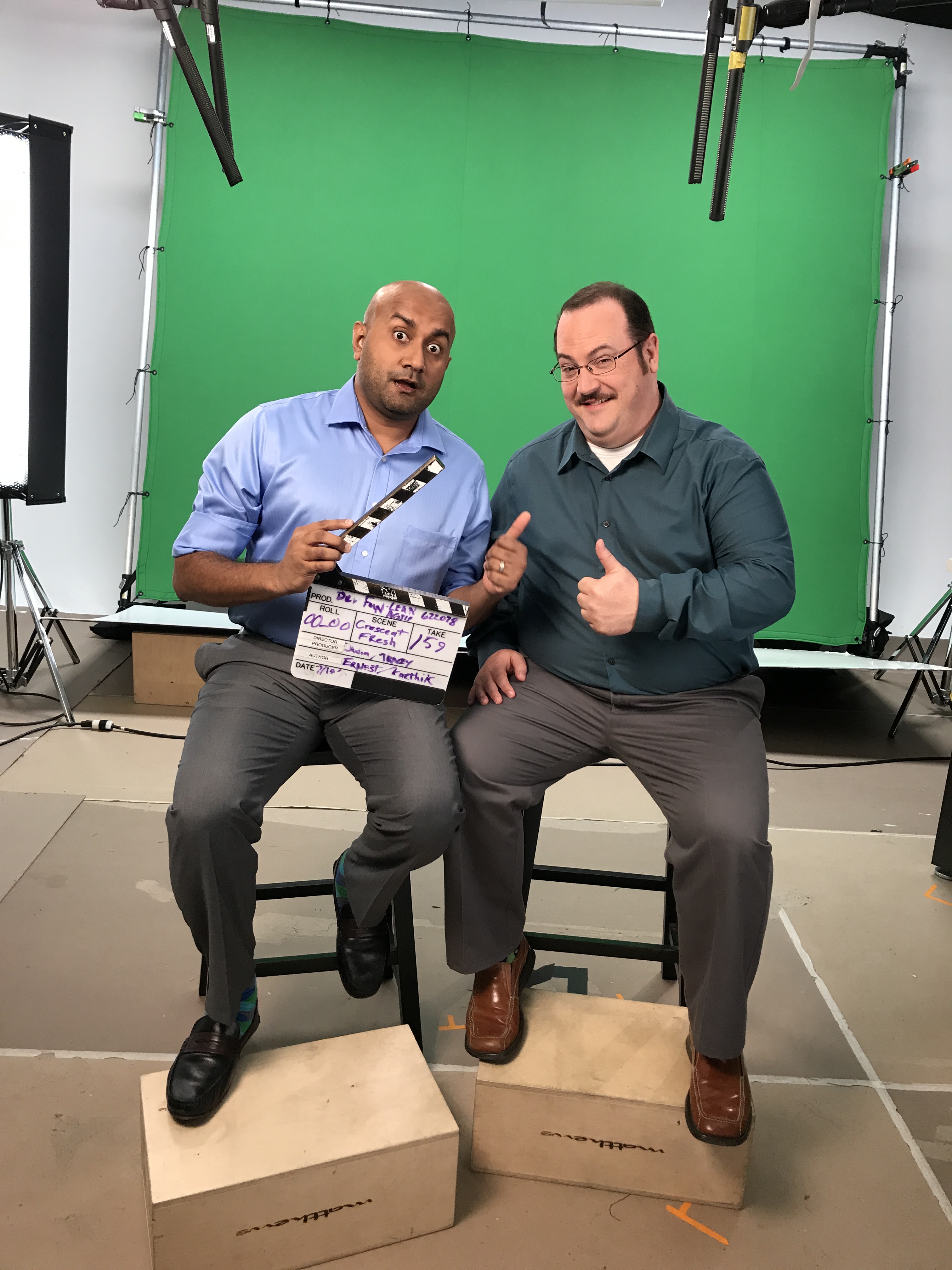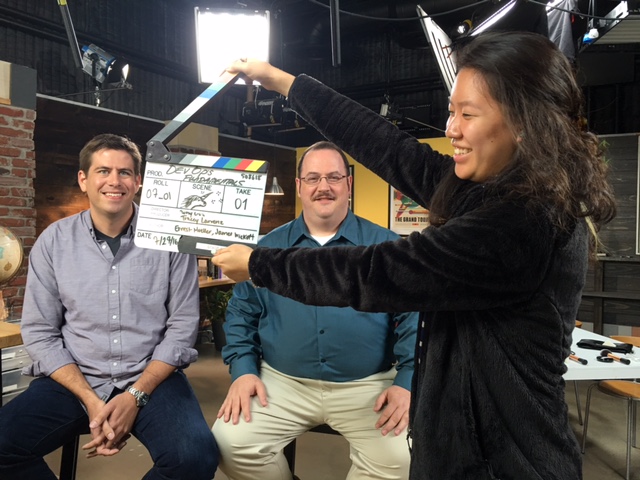 I know we’ve been quiet on the blog, all four agile admins have been busy – several of us moved to new jobs, everyone has a lot going on.
I know we’ve been quiet on the blog, all four agile admins have been busy – several of us moved to new jobs, everyone has a lot going on.
But we’re still doing stuff! I just went out to Carpenteria to film a LinkedIn Learning course on Incident Management. The agile admins have a full DevOps curriculum on LinkedIn Learning (which was lynda.com); most of them are in the “Become a DevOps Engineer” learning path! You can view them as a LIL member or they can be bought individually nowadays too.
We’ve done the 101 level (DevOps Foundation), the 201 level (CI/CD, CM/Infrastructure as Code, SRE, Monitoring and Observability, Lean and Agile) and now we’re hitting more details – Karthik’s done a bunch of Kubernetes and Cloud Native courses, Peco is doing more monitoring courses, James is doing DevSecOps courses…
 And I just went and filmed an Incident Management course. Incident Response, really, I’m hoping for a subsequent course that focuses on retrospectives (each class is only like an hour long and retros are a huge fun topic so I wanted to give them enough time on their own).
And I just went and filmed an Incident Management course. Incident Response, really, I’m hoping for a subsequent course that focuses on retrospectives (each class is only like an hour long and retros are a huge fun topic so I wanted to give them enough time on their own).
Pictured are my producers Adam and Lori and my live action director Julia (who’s also done some of my other courses!) This was a slides course (my first), but they have a program where they can add in a little live action, and since I’ve done it a bunch and Julia’s great we burned through a bunch of scripts in a short time on camera! Thanks to all of them (and my content manager Brian Anderson, not pictured).
The Course
I’ve been creating IM processes and training and leading organizations in them for a while now. A good incident response program removes friction and lets your smart technical staff focus on one thing, solving the problem, without having to worry about what to do otherwise. When I left AlienVault, the #1 thing people came and said to me in my 2 week notice period was “Hey, that incident management process, that’s really made a huge difference,” which is great to hear.
And it was a good opportunity to refresh on the newer developments in the field. I first got into modern IM, which I defines as “derived from the Incident Command System”, in 2008 after I heard Brent Chapman speak at Velocity on Incident Command for IT: What We Can Learn from the Fire Department. But (aside from retros) while that concept spread, for 5-6 years there wasn’t really a lot more in terms of new developments. Luckily that’s changed, and there’s been a lot lately. John Allspaw and J. Paul Reed have both done masters’ theses with Lund University’s Division of Risk Management and Societal Safety; there’s a new O’Reilly book Incident Management for Operations as well as IM being a hot topic in the Google SRE books, and so on. The REdeploy conference and Thai Wood’s Resilience Roundup weekly email newsletter and the Oncall Nightmares podcast re full of late breaking developments. (These sources and more are listed in the course handout!)
Special thanks to J. Paul for giving me guidance on the course content and giving me permission to use his and Kevina Finn-Braun’s Incident Lifecycle Model in it.
Expect video topics like:
- Why Do I Need Incident Management?
- The Incident Command System
- Scoping the Problem
- Your Incident Toolchain
- Incident Toolchain Example
- Detecting and Reporting Incidents
- First Response and Escalation
- Incident Communication With Your Users
- Communicating Inside Your Organization
- Best Practices for Diagnosis and Repair
- Cleaning Up After
- Continuously Improving
- Training and Game Days
- Implementation Challenges
Oh, and I got to use props for the first time (like that fire extinguisher in the lead pic), we threw some in for kicks. Fun!
The Experience
Speaking of that, I just wanted to give the LinkedIn Learning team a shout-out. Making courses with them is a great experience, class all the way. They are all super skilled at what they do and super friendly. Going to their campus/studio in Carpenteria, CA is always an exceedingly pleasant experience. Everything’s top notch, sound booths, live action studios… It’s not the average webcam tech course when you’re looking down the barrel of a camera with a director, a producer, and a sound/teleprompter person fussing over the fine details! If you are an expert in something (not just tech) and are interested in doing courses, I’m happy to introduce you to someone there; it’s all top quality.
And they treat their people well there! As best as I can tell they always have, from when they were Lynda to when they were LinkedIn to now being owned by Microsoft. Lori confided in me, “I was a documentary filmmaker with a non-profit for years and I didn’t know jobs like this existed; I’ve never been treated so well.”
While I was there they were doing their monthly “InDay”, and apparently this is the most anticipated one of a year as it’s game themed. They had inflatable human foozball, arcade games, did up the cafeteria with a Stranger Things theme, even had a D&D training session.
 And of course Carpinteria is beautiful, right on the beach, extremely temperate. It’s between Ventura and Santa Barbara, just north of LA. If you go out there, my hot tips are the nearby Shoals restaurant (a little down the 101) where you can get a table right on the water, and Chocolats du CaliBressan, a French chocolatier down in the far north end the beach side of Carpinteria. Oh and the booze is super cheap in the supermarket, so we always make some gin and juice and hang out in the Holiday Inn’s hot tub while we’re there…
And of course Carpinteria is beautiful, right on the beach, extremely temperate. It’s between Ventura and Santa Barbara, just north of LA. If you go out there, my hot tips are the nearby Shoals restaurant (a little down the 101) where you can get a table right on the water, and Chocolats du CaliBressan, a French chocolatier down in the far north end the beach side of Carpinteria. Oh and the booze is super cheap in the supermarket, so we always make some gin and juice and hang out in the Holiday Inn’s hot tub while we’re there…

 I know we’ve been quiet on the blog, all four agile admins have been busy – several of us moved to new jobs, everyone has a lot going on.
I know we’ve been quiet on the blog, all four agile admins have been busy – several of us moved to new jobs, everyone has a lot going on. And I just went and filmed an Incident Management course. Incident Response, really, I’m hoping for a subsequent course that focuses on retrospectives (each class is only like an hour long and retros are a huge fun topic so I wanted to give them enough time on their own).
And I just went and filmed an Incident Management course. Incident Response, really, I’m hoping for a subsequent course that focuses on retrospectives (each class is only like an hour long and retros are a huge fun topic so I wanted to give them enough time on their own).



 And of course Carpinteria is beautiful, right on the beach, extremely temperate. It’s between Ventura and Santa Barbara, just north of LA. If you go out there, my hot tips are the nearby
And of course Carpinteria is beautiful, right on the beach, extremely temperate. It’s between Ventura and Santa Barbara, just north of LA. If you go out there, my hot tips are the nearby  James and I did
James and I did 

